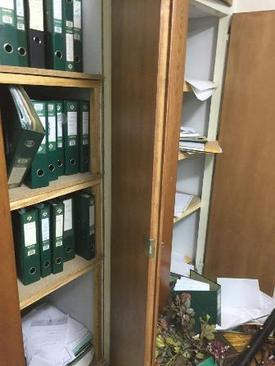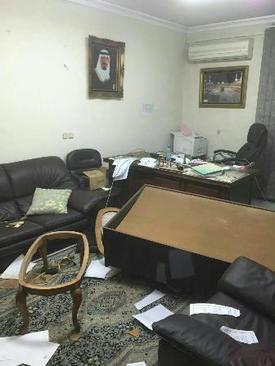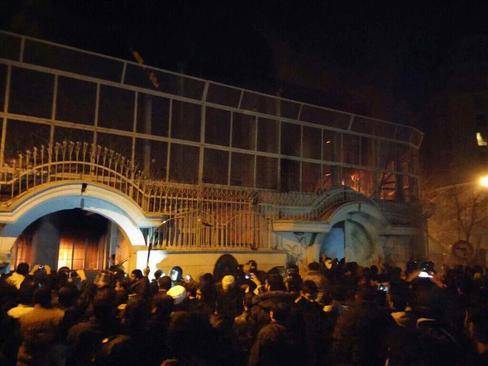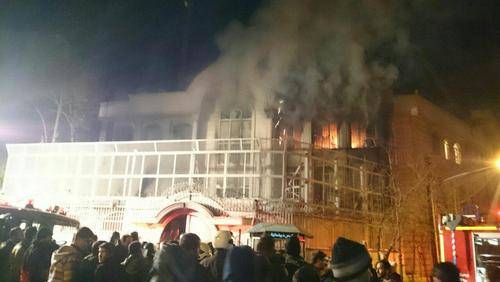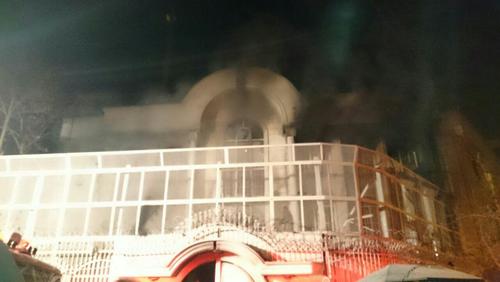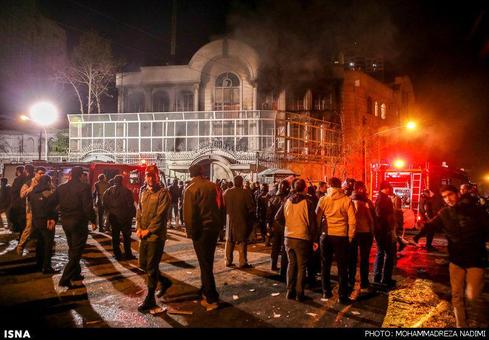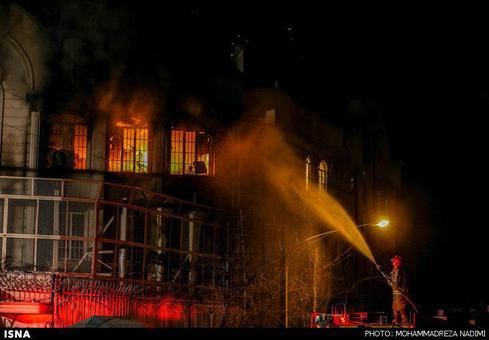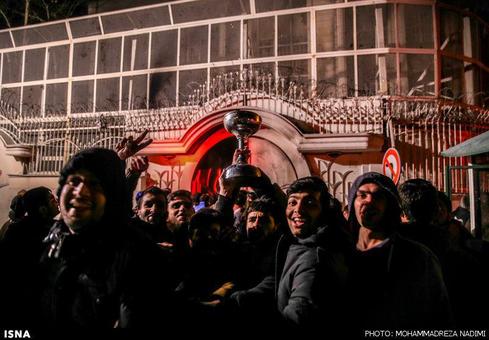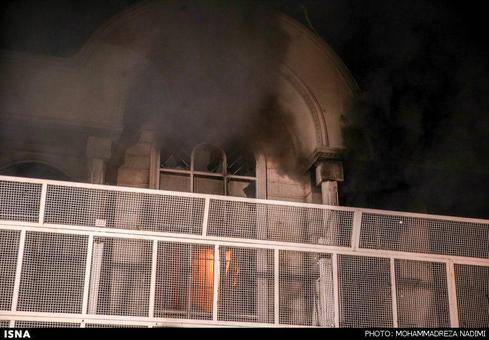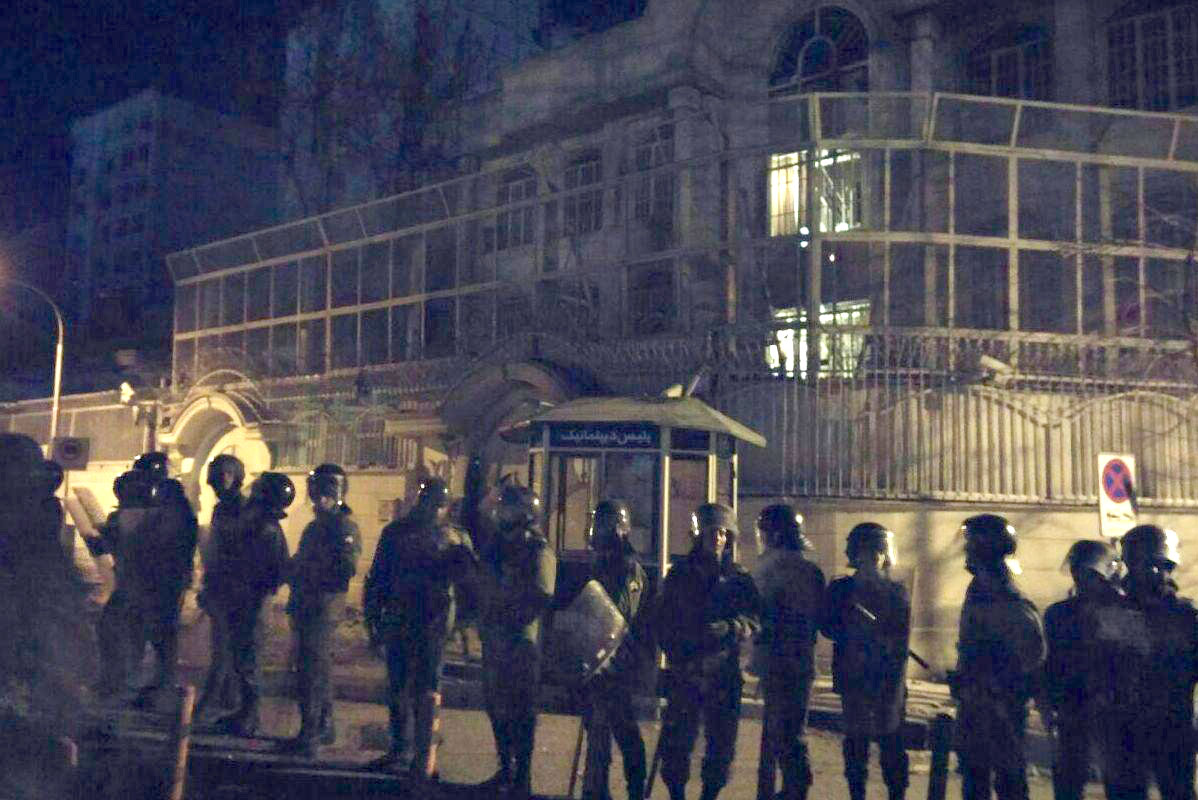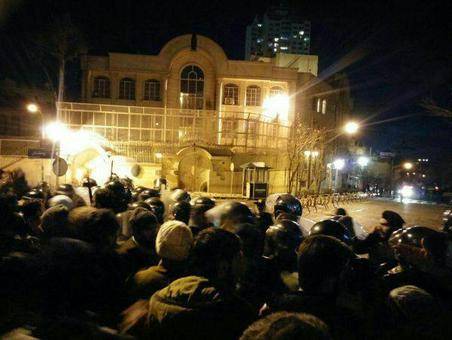Navigation
Install the app
How to install the app on iOS
Follow along with the video below to see how to install our site as a web app on your home screen.

Note: This feature currently requires accessing the site using the built-in Safari browser.
More options
You are using an out of date browser. It may not display this or other websites correctly.
You should upgrade or use an alternative browser.
You should upgrade or use an alternative browser.
Protesters Storm, Set Fire To isis (Saudi) Embassy In Iran
- Thread starter dani67
- Start date
Dem Muslims is mad...
Shi'ite Muslims worldwide decry execution of Saudi cleric
2 Jan.`16 - Saudi Arabia's execution of a leading cleric from the Shi'ite Muslim minority drew protests from around the world against the ruling Al Saud family and threatened to further intensify a wave of sectarian conflict in the Middle East.
See also:
The Latest: Protesters enter Saudi embassy in Iran
2 Jan.`16 — The latest developments following Saudi Arabia's execution of 47 people, including a prominent opposition Shiite cleric who had rallied demonstrations in the kingdom (All times local).
Shi'ite Muslims worldwide decry execution of Saudi cleric
2 Jan.`16 - Saudi Arabia's execution of a leading cleric from the Shi'ite Muslim minority drew protests from around the world against the ruling Al Saud family and threatened to further intensify a wave of sectarian conflict in the Middle East.
Lebanon's Supreme Islamic Shi'ite Council called Saturday's execution of cleric Nimr al-Nimr a "grave mistake", and the Hezbollah group termed it an assassination as Shi'ites took to the streets in protest from Tehran to Kashmir. Saudi Arabia executed 47 people including Nimr, whom the government accused of inciting violence against the police. His supporters, however, said he was a peaceful dissident who advocated greater rights for the kingdom's Shi'ite minority.
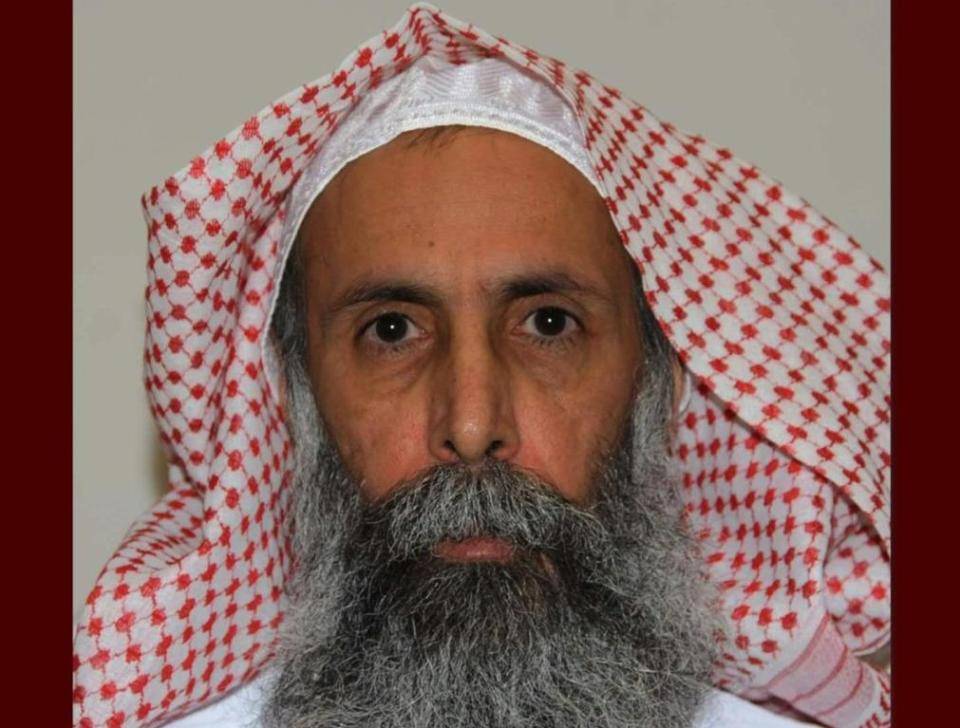
Nimr al-Nimr, executed in Saudi Arabia, was a charismatic religious leader who delivered fiery speeches demanding more rights for the Shiite minority
Scores of Shi'ites in Saudi Arabia's Eastern Province marched through Nimr's home district of Qatif shouting "down with the Al Saud", and several hundred gathered in nearby Bahrain, a Sunni-ruled island kingdom allied to Saudi Arabia. In Iran, a Shi'ite theocracy and rival to Saudi Arabia, state media channels carried non-stop coverage of clerics and secular officials praising Nimr and predicting the downfall of Saudi Arabia's Sunni ruling family.

A Bahraini anti-government protester holds up a picture of Saudi Shiite cleric Sheikh Nimr al-Nimr, whose execution in Saudi Arabia was announced Saturday, during a peaceful demonstration in Daih, Bahrain, Saturday, Jan. 2, 2016. Saudi Arabia announced Saturday it had executed 47 prisoners convicted of terrorism charges, including al-Qaida detainees and al-Nimr, who rallied protests against the Saudi government. The execution of al-Nimr is expected to deepen discontent among Saudi Arabia's Shiite minority and heighten sectarian tensions across the region.
Shi'ite leaders in Iraq, Kuwait, Lebanon, and Yemen also warned of reprisals, in a signal that sectarian conflicts across the Middle East could be further inflamed.As a Saudi-led coalition announced the end of a ceasefire in its war with Yemen's Houthi movement, the Houthis said Nimr had been given a "mock trial". In India, hundreds of Shi'ites demonstrated in the Muslim-majority northern province of Kashmir, where one protest organizer said the charges against Nimr were "baseless".
TERRORISM CHARGES
See also:
The Latest: Protesters enter Saudi embassy in Iran
2 Jan.`16 — The latest developments following Saudi Arabia's execution of 47 people, including a prominent opposition Shiite cleric who had rallied demonstrations in the kingdom (All times local).
2:30 a.m.
Iran's semiofficial ISNA news agency says protesters upset over the execution of a Shiite cleric in Saudi Arabia have entered the Saudi embassy in Tehran, setting fires and throwing papers from the roof. The Saturday night ISNA report said that the country's top police official, Gen. Hossein Sajedinia, has rushed to the scene and police were working to disperse the crowd. The demonstrators were protesting the Saudi government's execution on Saturday of prominent Shiite cleric and activist Sheikh Nimr al-Nimr, along with 46 other condemned prisoners. Al-Nimr was one of the leaders Saudi Arabia's Shiite Muslim minority and was convicted for his role in multiple protests that turned violent. He remained a staunch critic of the ruling Al Saud family, but maintained that he never advocated violence.
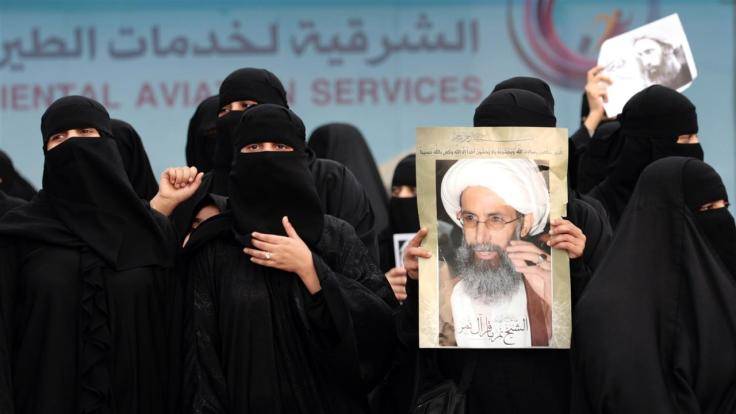
Shiite cleric Nemer al-Nemer was among 47 people executed in Saudi Arabia on Saturday. The execution sparked protests around the globe.
2 a.m.
U.S. State Department spokesman John Kirby says the Saudi Arabian government needs to respect and protect human rights after the execution of 47 people, including a prominent opposition Shiite (SHEE'-eyet) cleric. Kirby says in a statement Saturday that the U.S. is calling on Saudi Arabia to ensure fair judicial proceedings and permit peaceful expression of dissent while working with all community leaders to defuse tensions after the executions. Kirby said the U.S. is particularly concerned that the execution of a prominent Shiite cleric and political activist risks making sectarian tensions worse at a time when they urgently need to be reduced.
11 p.m.

Bahraini anti-government protesters carry a palm tree trunk to block a street from police during a demonstration against Saudi Arabia's execution of Shiite cleric Sheikh Nimr al-Nimr, in Daih, Bahrain, Saturday, Jan. 2, 2016. Saudi Arabia announced Saturday it had executed 47 prisoners convicted of terrorism charges, including al-Qaida detainees and al-Nimr, who rallied protests against the Saudi government. The execution of al-Nimr is expected to deepen discontent among Saudi Arabia's Shiite minority and heighten sectarian tensions across the region.
Saudi Arabia says it has summoned Iran's envoy to the kingdom to protest critical comments by Iranian authorities over the execution of an influential Saudi Shiite cleric, Sheikh Nimr al-Nimr. In a statement late Saturday by the Saudi Press Agency, the Saudi Foreign Ministry described the Iranian criticism of its judicial system as "blatant interference" in its internal affairs. Earlier, the Iranian Foreign Ministry had summoned the Saudi envoy in Tehran to protest the execution of the Shiite cleric, who was among 47 prisoners executed Saturday. Iran's parliament speaker warned that the execution would prompt "a maelstrom" in Saudi Arabia. The execution threatens to stoke further sectarian tensions between the regional rivals who back opposing sides in civil wars in Yemen and Syria.
10:45 p.m.
Well the Sunni vs Shite holy war is in full swing now!
And in Saudi all they're saying is:
"NEXT"
Iraq steps up to mediate between Saudi Arabia and Iran...
Iraq offers to mediate between Saudi Arabia, Iran
Jan 6,`16 -- Iraq on Wednesday offered to mediate between Saudi Arabia and Iran after tensions soared following the kingdom's execution of a Shiite cleric and attacks on two Saudi diplomatic posts in the Islamic Republic.
Iraq offers to mediate between Saudi Arabia, Iran
Jan 6,`16 -- Iraq on Wednesday offered to mediate between Saudi Arabia and Iran after tensions soared following the kingdom's execution of a Shiite cleric and attacks on two Saudi diplomatic posts in the Islamic Republic.
The standoff has seen Saudi Arabia sever diplomatic ties with its longtime regional rival and could hinder efforts to resolve the conflicts in Syria and Yemen, where Riyadh and Tehran back opposite sides, as well as affect the implementation of the Iran nuclear deal. Iraqi Foreign Minister Ibrahim al-Jaafari proposed mediation during a news conference in Tehran, but also referred to the execution of Sheikh Nimr al-Nimr as a "crime." Saudi Arabia and its allies say al-Nimr was found guilty of terrorism charges, and that condemnations of the execution amount to meddling in Riyadh's internal affairs. Iraq has undertaken a delicate balancing act amid the latest regional turmoil. The Shiite-led government in Baghdad relies on Iranian help to battle the extremist Islamic State group, but is also trying to repair ties to oil-rich Saudi Arabia, which last week sent an ambassador to Baghdad for the first time in 25 years.
Speaking alongside Iranian Foreign Minister Mohammad Javad Zarif, al-Jaafari said Iraq's place in the heart of the Middle East allows it to play a role in trying to "alleviate tensions." "This responsibility has been given to us and we have been active from the early moments to lessen tensions to prevent a disaster from happening that could affect the entire region," he said. Back in Iraq, however, thousands of Iranian-backed Shiite militiamen marched in Baghdad and across the south to protest the execution of al-Nimr. Qais al-Khazali, the head of the powerful Asaib Ahl al-Haq militia, gave a speech in the southern city of Basra in which he called on Baghdad to cut diplomatic ties with Saudi Arabia, expel the newly arrived ambassador and boycott Saudi goods.

Amel Al-Hajjar, left, and Khadija Falih, both from Iraq, participate in a rally in front of the Saudi Arabian embassy in Washington, Tuesday, Jan. 5, 2016, to protest the mass executions in Saudi Arabia. Saudi Arabia executed last Saturday, Shiite cleric Sheikh Nimr al-Nimr and 46 others convicted of terror charges, the largest mass execution carried out by the kingdom since 1980.
Russia also has offered itself as a potential mediator, though it's unclear whether Saudi or Iranian officials have responded to the proposal. Zarif, meanwhile, blamed Saudi Arabia for exacerbating the situation. "We have treated these actions with magnanimity and nobleness but unfortunately our neighbor, Saudi Arabia, did not respond to it properly," he said. "The process of provoking tension must be stopped." The diplomatic standoff between Iran and Saudi Arabia began Saturday, when the kingdom executed al-Nimr and 46 others convicted of terror charges - the largest mass execution it has carried out since 1980.
Iranian protesters responded by attacking the Saudi Arabia's embassy in Tehran and its consulate in Mashhad. Late Sunday, Saudi Arabia announced it was severing relations with Iran because of the assaults. On Wednesday, Iranian diplomats in Saudi Arabia returned to Tehran, according to state media. Since Saudi Arabia severed ties to Iran, a host of its allies have cut or reduced their ties as well. Among those is Bahrain, which said Wednesday it had broken up a Shiite militant group backed by the Lebanese Hezbollah and the Iranian Revolutionary Guard. Bahrain's Interior Ministry accused the suspects of receiving $20,000 from Hezbollah leader Hassan Nasrallah, and of having links to those behind a July 2015 bombing that killed two police officers.
MORE
What goes around, comes around...
Tehran: Saudi Arabia Airstrikes Hit Iran Embassy in Yemen
January 07, 2016 - The diplomatic crisis between Iran and Saudi Arabia intensified Thursday, with Tehran banning all Saudi imports and accusing Riyadh of conducting "deliberate" airstrikes on its embassy in Yemen.
See also:
Islamic State Militants Target Saudi Arabia
January 06, 2016 - Iran isn’t alone in issuing dire threats against Saudi Arabia — the Islamic State has ratcheted up a propaganda campaign against the Gulf kingdom’s ruling family, denouncing them for siding with the U.S.-led coalition against the jihadists and urging followers to oust them.
Tehran: Saudi Arabia Airstrikes Hit Iran Embassy in Yemen
January 07, 2016 - The diplomatic crisis between Iran and Saudi Arabia intensified Thursday, with Tehran banning all Saudi imports and accusing Riyadh of conducting "deliberate" airstrikes on its embassy in Yemen.
Iranian Foreign Ministry spokesman Hossein Jaber Ansari said the alleged air attacks in the Yemeni capital, Sanaa, were "a violation of all international conventions that protect diplomatic missions," according to state television. "Saudi Arabia is responsible for the damage to the embassy building and the injury to some of its staff," he said. His statement did not specify who was wounded or to what extent. Saudi Arabia is carrying out a campaign of airstrikes in Yemen in support of forces fighting against Iranian-backed Houthi Shi'ite rebels. Riyadh has not commented on the Iranian accusations.
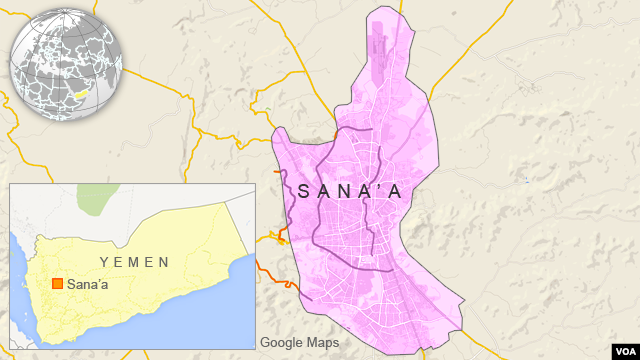
Saudi imports banned
Also Thursday, Iran's cabinet banned the import of all products from Saudi Arabia, according to a government statement. It also put in place a ban on Iranians traveling to the holy city of Mecca. The developments come after Saudi Arabia cut diplomatic ties with Iran last week following violent protests at the Saudi embassy in Tehran. The protesters were upset over the Saudi execution of prominent Shi'ite cleric Nimr al-Nimr, who was critical of the Riyadh kingdom. Several Arab countries have since severed diplomatic relations with Iran, in solidarity with Saudi Arabia. Other nations have downgraded ties with Tehran.
Tehran: Saudi Arabia Airstrikes Hit Iran Embassy in Yemen
See also:
Islamic State Militants Target Saudi Arabia
January 06, 2016 - Iran isn’t alone in issuing dire threats against Saudi Arabia — the Islamic State has ratcheted up a propaganda campaign against the Gulf kingdom’s ruling family, denouncing them for siding with the U.S.-led coalition against the jihadists and urging followers to oust them.
“The Islamic State has exerted much effort in the last couple of weeks to attacking Saudi Arabia in an extensive and well-coordinated media campaign,” says Marwan Khayat, an analyst at the Middle East Media Research Institute (MEMRI), a Washington-based group that monitors jihadist propaganda. In an outpouring of videos and social media postings that increased noticeably in tempo more than two weeks ago, the terrorist army’s propagandists have been exhorting the kingdom’s Sunni Muslims to target the ruling House of Saud as well as the Wahhabi religious establishment and the Saudi military underpinning the royal family. Ironically, in light of Iran’s fury over the execution at the weekend of an influential Shi’ite cleric, one of the Islamic State’s chief charges against the Saudi royals is that they have allowed the kingdom’s Shi'ite Muslims - considered apostates by IS - a free hand to live and practice their religion in the country.
'Divine vengeance'
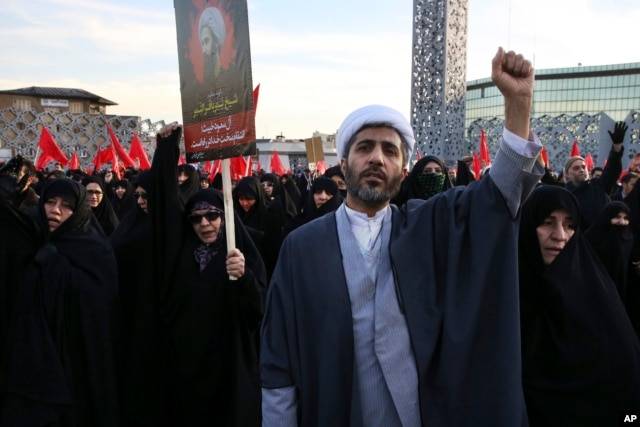
A Muslim cleric chants slogans alongside women in a rally to protest the execution by Saudi Arabia last week of Sheikh Nimr al-Nimr, a prominent opposition Saudi Shiite cleric, in Tehran, Iran
Following Saudi Arabia's executions of four Shi'ite Muslims Saturday, Iran threatened “divine vengeance." Most international attention since has focused on the conflict between Saudi Arabia and Iran. But 43 Sunni jihadists were among the executed prisoners and since their slayings IS has pledged to target the al-Ha’ir and Tarifya prisons, two facilities where al-Qaida and IS suspects are being held. But even before the executions, IS had upped its propaganda threats against the Saudi royal family. In one video from Iraq’s al-Anbar province, an IS member called Abu Khalid al-Jazrawi denounces the presence of Shi'ites in Saudi Arabia and laments what he called the failure of the Saudi government to fully implement Sharia law.
In the same 15-minute video, another IS member, Abu 'Azzam al-Jazrawi, accuses the kingdom’s religious scholars of hypocrisy. He calls on IS supporters in Saudi Arabia, including those seeking martyrdom, to target "the enemies of Allah,” saying, "they are among you and on your streets. There is no easier way to kill them and there is nothing more delicious than spilling their blood.” This isn’t the first time Islamic State propagandists have targeted the Saudi royal family. Like al-Qaida, the jihadist group IS spun off from, IS views Saudi princes and other Gulf ruling families as much the enemy as the West — this despite the fact that they have aided ultraconservative Salafist militias and groups in the region, including the Army of Conquest, a rebel alliance in Syria which boasts al-Qaida affiliate Jabhat al-Nusra as a dominant member.
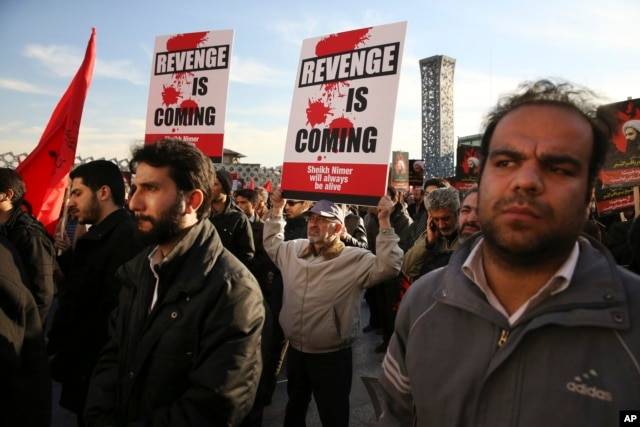
Iranian demonstrators hold anti-Saudi placards in a rally to protest the execution by Saudi Arabia last week of Sheikh Nimr al-Nimr, a prominent opposition Saudi Shiite cleric, in Tehran, Iran
In May 2015, IS leader Abu Bakr al-Baghdadi condemned the House of Saud for collaborating with the West. He claimed the Islamic State group is the only genuine protector of Sunnis. And in December, al-Baghdadi denounced a new Saudi-led Islamic military alliance of 34 countries created to “coordinate and support military operations to fight terrorism.” Since then, the output of anti-Saudi propaganda has increased.
Anti-Saudi videos
Similar threads
- Replies
- 12
- Views
- 154
- Replies
- 22
- Views
- 358
- Replies
- 28
- Views
- 374
- Replies
- 10
- Views
- 130
Latest Discussions
- Replies
- 487
- Views
- 16K
- Replies
- 27
- Views
- 118
Forum List
-
-
-
-
-
Political Satire 8087
-
-
-
-
-
-
-
-
-
-
-
-
-
-
-
-
-
-
-
ObamaCare 781
-
-
-
-
-
-
-
-
-
-
-
Member Usernotes 471
-
-
-
-
-
-
-
-
-
-
